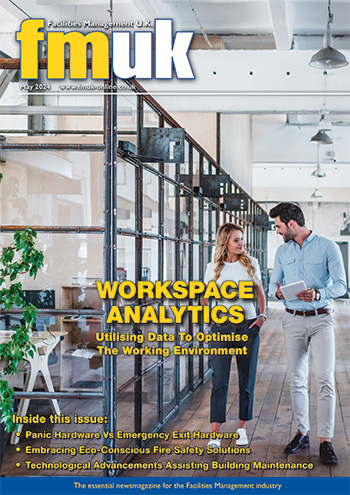The Energy Crunch And The Confidence Crisis:
How Facilities Managers Can Take Action
 Many organisations are facing increasingly challenging times, particularly when it comes to navigating the huge volatility we’ve seen in the wholesale energy markets over the last 12 months. With very little sign that the cost pressures are easing, Anthony Ainsworth, Chief Operating Officer at npower Business Solutions, looks at the impact of this uncertainty and the steps facilities managers can take to protect themselves from risk.
Many organisations are facing increasingly challenging times, particularly when it comes to navigating the huge volatility we’ve seen in the wholesale energy markets over the last 12 months. With very little sign that the cost pressures are easing, Anthony Ainsworth, Chief Operating Officer at npower Business Solutions, looks at the impact of this uncertainty and the steps facilities managers can take to protect themselves from risk.
The impact of the energy crisis on business confidence was the key question we wanted to address in our Business Energy Tracker report - a major new piece of research where over 200 large organisations - told us the real impact the UK energy crisis is having on their confidence to invest, particularly in the crucial measures that will help the UK meet its net zero target.
The findings from the report are clear - 77% of respondents say energy is now their biggest business risk and that it is a board level concern for 8 out of 10 organisations.
Worryingly, almost half of respondents (49%) think that the current energy crisis will harm net zero progress and, while two thirds (67%) believe that net zero by 2050 is achievable, nine in 10 (93%) were concerned about the potential cost impact of funding the low-carbon transition on their business.
Understandably, as a result, businesses are overwhelmingly calling on Government for more support to help them navigate this current crisis and support their short, medium and long term plans.
The report showed us that businesses back net zero - nearly three quarters (72%) believe that their organisation will benefit from the low carbon transitions. The main positives were achieving greater resiliency through saving money and carbon (33%), and reputational benefits (20%). One in eight (12%) also believe that a strong approach to net zero will help them attract the next generation of talent.
However, at the moment, the message coming through loud and clear from this research is that current policy is not doing the job it needs to do to support them at a time when energy is their biggest concern.
That is why it is more important than ever that the voice of business is heard at a time when Government is shaping policy around energy independence and net zero.
How Can Facilities Managers Reduce Energy Risk?
When it comes to reducing risk, there are several steps facilities managers can take.
The first is to maximise energy efficiency - it goes without saying that the less energy you use, the less you will pay. It was highlighted in the Business Energy Tracker as the top tactic organisations were taking - more than half (58%) said they were increasing energy efficiency - which rose significantly to 84% among those that spend more than £2 million on energy.
The second is to look at your energy contract - now more than ever it is important to work with your energy team and review your purchasing strategy to ensure it reflects the current level of risk appetite and that electricity and gas budgets are realistic in the current climate.
Thirdly, get a handle on your data - Understanding exactly where and how you are using energy is crucial to reducing both costs and carbon. A sophisticated energy management system will help you monitor power and gas consumption throughout your organisation – and the related emissions. Depending on the nature of your business, sub-metering can also help to provide more granular detail about specific energy uses, such as machinery, lighting, or temperature control. Businesses are seeing the value in using smart energy management technologies - the Business Energy Tracker revealed that 40% are already using them, and a further 39% are planning to install them.
You can also consider investing in sustainable on-site generation such as solar, wind or combined heat and power (CHP). This has multiple benefits, not least making your organisation less reliant on the grid. Again, this was a popular option in our report - more than a quarter (27%) of respondents said they are investing in this measure to combat energy risk. Many options now have an attractive ROI, so it’s important to work with your energy partner to help you make a strategic plan.
What Do Organisations Want To See From Government?
As mentioned, the businesses we spoke to overwhelmingly believe that Government needs to do more to support them as they navigate the current crisis.
For example, businesses were clear that, where possible, they want their operations to be powered by low-cost renewable sources. As such, when asked what measures they would like to see from Government in terms of energy policy, the top answer was more incentives to switch to renewable energy, with 56% of respondents calling for this action.
Almost half of businesses (49%) also want to see a reduction in the UK’s reliance on gas or imports and 46% want greater protection against current and future wholesale market volatility.
In addition, nearly half (45%) want to see an acceleration in investment in technologies to support their business’s net zero plans, such as hydrogen and carbon capture and storage (CCS).
Energy Policy Needs To Step Up
For us, this research shows that there are several key actions that should be considered:
- There is a need to accelerate energy efficiency: Hydrogen will be an important fuel for decarbonising major energy users, but viable green sources at scale can’t really be expected until the end of this decade. We need to double down on action that can have an impact now: reducing energy demand through energy efficiency and electrifying heat and transport where possible. While existing schemes such as the tax incentives and capital allowances go some way to supporting this, more can be done.
- A greater focus on direct business support: We need to ensure that organisations, as well as households, can survive the coming cost of living crisis as energy and other costs rise rapidly. Government support for households is welcome, but support for hard-pressed businesses or public institutions is so far scant. Therefore, policy support for businesses is a key priority in the next Autumn Budget.
- Net zero cannot lose momentum: The next 10 years is undoubtedly the ‘decade of delivery’ when it comes to net zero. That is why it is so important that net zero momentum cannot stall. This research shows that there is a weakening confidence in net zero, despite many organisations recognising the benefits it will bring. Businesses need support to keep their plans on track.
We are committed to ensuring that the voice of business is heard at the highest level. The insight from the Business Energy Tracker will give us the opportunity to present the findings to Government, as well as other influential stakeholders.
Only by working together will we see the progress we all need.
You can download your copy of Business Energy Tracker at
https://npowerbusinesssolutions.com/businessconfidence
Click the article to enlarge it.


























































